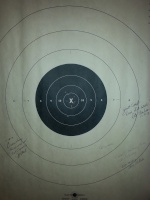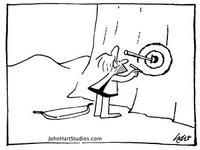Thumb on 1911 safety?
+3
kwixdraw
dronning
beeser
7 posters
Page 1 of 1
beeser- Posts : 1154
Join date : 2014-06-19
 Re: Thumb on 1911 safety?
Re: Thumb on 1911 safety?
No, IMHO, ANY thumb pressure is bad and that includes resting it on the safety.
- Dave
- Dave

dronning- Posts : 2581
Join date : 2013-03-20
Age : 71
Location : Lakeville, MN
 Re: Thumb on 1911 safety?
Re: Thumb on 1911 safety?
Its an invitation to having your thumb drag the slide and change the force needed to cycle the gun. Inconsistency in any form is bad for accuracy.

kwixdraw- Posts : 221
Join date : 2014-09-04
Location : Scott County TN
 Re: Thumb on 1911 safety?
Re: Thumb on 1911 safety?
Without thumb pressure you cannot keep a consistent grip. It shows badly at 50 yards and not to bad at 25 yards. Thumb pressure takes a lot of focused practice to master. If you have inconsistent thumb/thumb pad (heel) pressure you will get shots at 1:00 and 2:00 at 50 yards. Many people mistake it for heeling, but in many cases it's when you relax the thumb heel and during recoil the pistol will rotate in the hand. All masters use their thumb!
Jon
Jon

Jon Eulette- Posts : 4399
Join date : 2013-04-15
Location : Southern Kalifornia
 Re: Thumb on 1911 safety?
Re: Thumb on 1911 safety?
Jon Eulette wrote:Without thumb pressure you cannot keep a consistent grip. .....
Jon
Jon you are correct, I was referring to the tip of the thumb and should have been more specific. By the very nature of where the gun is placed in your hand the thumb is in play.
Proper thumb placement ala Zins
http://www.brianzins.com/2010/06/11/grip/


dronning- Posts : 2581
Join date : 2013-03-20
Age : 71
Location : Lakeville, MN
 Re: Thumb on 1911 safety?
Re: Thumb on 1911 safety?
As a training exercise, consciously stretch thumb towards the target beside the grip. The thumb ham will pressure the backstrap nicely. Then figure out how to do that subconsciously.
The picture above appears that Zins hand is smaller than mine. Small hands might have different methods than large hands.
The picture above appears that Zins hand is smaller than mine. Small hands might have different methods than large hands.

Jack H- Posts : 2699
Join date : 2011-06-10
Age : 75
Location : Oregon
 Re: Thumb on 1911 safety?
Re: Thumb on 1911 safety?
if it helps you shoot consistently good shots use it, different grips for different folks.

DavidR- Admin
- Posts : 3032
Join date : 2011-06-10
Age : 70
Location : NRA:Expert, Georgia
 Re: Thumb on 1911 safety?
Re: Thumb on 1911 safety?
Interesting photo for lots of reasons. Williams trigger shoe. Full wrap skateboard tape around the mainspring housing and under the grips. Large head on the magazine release (Why have one on a bullseye gun?).

kwixdraw- Posts : 221
Join date : 2014-09-04
Location : Scott County TN
beeser- Posts : 1154
Join date : 2014-06-19
beeser- Posts : 1154
Join date : 2014-06-19
 Re: Thumb on 1911 safety?
Re: Thumb on 1911 safety?
zins uses the crease of the first joint, but this doesn't work for everyone same for his grip he teaches, go to the bullseye encyclopedia and read the articles (many) from great shooters of the past, none recommend a grip like zins, but they won the nationals so it shows one grip doesn't fit all, try all the ones described and see if any work for you. majority of shooters use the firm part of the finger just before the crease as do I.

DavidR- Admin
- Posts : 3032
Join date : 2011-06-10
Age : 70
Location : NRA:Expert, Georgia
beeser- Posts : 1154
Join date : 2014-06-19
beeser- Posts : 1154
Join date : 2014-06-19
 Re: Thumb on 1911 safety?
Re: Thumb on 1911 safety?
beeser wrote:This truly is a conundrum. I just read Brian Zins article on Trigger Control and he cleanly states that the first crease of the forefinger should be placed on the center of the trigger. Simply put, this is not possible with my seemingly smaller hands, current gun and the grip described above.
If you read the blog questions he clarifies the finger position
Brians answer to finger placement question.
"You are correct. The right edge is dug in to the crease in the joint."
- Dave
Link
http://www.brianzins.com/2010/03/12/technique/
Last edited by dronning on 10/4/2014, 11:28 am; edited 1 time in total

dronning- Posts : 2581
Join date : 2013-03-20
Age : 71
Location : Lakeville, MN
 Re: Thumb on 1911 safety?
Re: Thumb on 1911 safety?
I'm lucky because several of the distinguished shooters that I shoot with have hands as small or smaller than mine. They didn't let it stop them. All that I know I learned from watching them and reading what I could.
I may be completely off base, but the importance of the grip is to activate the trigger without moving the gun. If you can do that, you are well on your way. That's what I got from Zins article as well. He says to try his grip and see how it works. The fact is that it will not work for everyone. If you can break the trigger without moving the gun with the pad, do it, you might be at a slight disadvantage to someone who can use the crease, but so what. Your fingers may just be too small to get the crease on the trigger without compromising the grip.
When I was talking to a friend yesterday we got on the subject of past Pistol Champions (primarily DeFino, Benner, McMillian and Hamilton). Everyone had a different grip. Benner's hands were so big they engulfed the gun and while McMillians weren't small they sure looked small in comparison. My friend shot with these guys in the early 60's and had such small hands there was no way he could copy their grips, so he developed his own over many hours at Pearl Harbor and Midway. But the first thing that he told me about the 1911 and hardball was that I had to develop a grip that would control the gun and allow me to activate the trigger without moving the sights.
This is mostly learned in dryfire and can be done anywhere you can dryfire. I was told to start by getting a grip that allowed me to raise the gun in such a way so as not to look for sight alignment (kind of like a shotgun in skeet or trap). Once there, the next step was to fine tune it so that I could activate the trigger without disturbing the sights.
I may be completely off base, but the importance of the grip is to activate the trigger without moving the gun. If you can do that, you are well on your way. That's what I got from Zins article as well. He says to try his grip and see how it works. The fact is that it will not work for everyone. If you can break the trigger without moving the gun with the pad, do it, you might be at a slight disadvantage to someone who can use the crease, but so what. Your fingers may just be too small to get the crease on the trigger without compromising the grip.
When I was talking to a friend yesterday we got on the subject of past Pistol Champions (primarily DeFino, Benner, McMillian and Hamilton). Everyone had a different grip. Benner's hands were so big they engulfed the gun and while McMillians weren't small they sure looked small in comparison. My friend shot with these guys in the early 60's and had such small hands there was no way he could copy their grips, so he developed his own over many hours at Pearl Harbor and Midway. But the first thing that he told me about the 1911 and hardball was that I had to develop a grip that would control the gun and allow me to activate the trigger without moving the sights.
This is mostly learned in dryfire and can be done anywhere you can dryfire. I was told to start by getting a grip that allowed me to raise the gun in such a way so as not to look for sight alignment (kind of like a shotgun in skeet or trap). Once there, the next step was to fine tune it so that I could activate the trigger without disturbing the sights.

jmdavis- Posts : 1409
Join date : 2012-03-24
Location : Virginia
beeser- Posts : 1154
Join date : 2014-06-19
 Re: Thumb on 1911 safety?
Re: Thumb on 1911 safety?
All respect to BZ and the other experts here, but have you read this?
See "C.Grip" about half way down.
http://www.bullseyepistol.com/chapter1.htm
I interpret this as the grip starts with the firm press of the pistol into the notch of the hand. I add, for small hands, press into the palm as well. One other thing I think is missing in the AMU dialog is the forward pressure with the thumb ham that I mentioned above. Also the thinner the grip panel on the right (for righty) the better. Left side not so important.
Then you worry on the trigger length. That part of the finger that presses the trigger should be as close as possible to 90deg from the bore line.
With a natural wrist angle, if you find the sights off, you can cant the pistol. If you cant the pistol inward a lot, raise the head and shoulder up from the slouch position. Another Jack H belief is if to raise the arm higher, you are ADDING support to the arm and therefore more stability.
See "C.Grip" about half way down.
http://www.bullseyepistol.com/chapter1.htm
I interpret this as the grip starts with the firm press of the pistol into the notch of the hand. I add, for small hands, press into the palm as well. One other thing I think is missing in the AMU dialog is the forward pressure with the thumb ham that I mentioned above. Also the thinner the grip panel on the right (for righty) the better. Left side not so important.
Then you worry on the trigger length. That part of the finger that presses the trigger should be as close as possible to 90deg from the bore line.
With a natural wrist angle, if you find the sights off, you can cant the pistol. If you cant the pistol inward a lot, raise the head and shoulder up from the slouch position. Another Jack H belief is if to raise the arm higher, you are ADDING support to the arm and therefore more stability.

Jack H- Posts : 2699
Join date : 2011-06-10
Age : 75
Location : Oregon
 Similar topics
Similar topics» Thumb on top or below the safety? 1911
» Thumb safety on a bullseye 1911
» Gripping the 1911: thumb position
» Mud Flap Thumb Safety
» Trick for re-installing 1911 thumb safety?
» Thumb safety on a bullseye 1911
» Gripping the 1911: thumb position
» Mud Flap Thumb Safety
» Trick for re-installing 1911 thumb safety?
Page 1 of 1
Permissions in this forum:
You cannot reply to topics in this forum